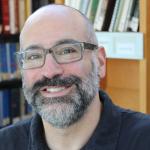4 ELU V’ELU and Arguing for the Sake of Heaven
Given the open ended nature of Turning Torah how is one to know which meaning is the right one? This is an excellent question, but not a Jewish one. For us there is no one right reading of Torah. There is only the next reading. Of course different Jews will have their preferences, claiming one reading to be superior to others, but this is personal bias rather than a system of right and wrong readings built into the process of Torah Turning.
Turning Torah this way forces us to open our minds to conflicting and often paradoxical turnings. For us it is never about which turning is true, but rather how can I make room for conflicting turnings in my head, my heart, and my life? We are not taught to unravel paradox, but to embrace paradox.
The pedagogy of our tribe is called machlochet l’shem Shamayim, an argument for the sake of heaven/godliness (Pirke Avot 5:17), and at its heart is the principle elu v’elu divrei Elohim Chayyim, this teaching and that teaching, no matter how contradictory, are both the words of the living God, (Talmud Eruvin 13a) if—and this can be a big if—the intent of each is to enhance compassion and justice. In other words if, for example, someone is using Torah to promote a position that violates the Jewish commitment to loving God (Deuteronomy 6:5), loving your neighbor (Leviticus 19:18), and loving the stranger (Leviticus 19:34; Deuteronomy 10:19) then we can be fairly certain that they are not arguing for the sake of heaven, but to promote their own agenda.
This still leaves lots of room for debate—what is love, who/what is God, who is your neighbor, and who is the stranger—but even here if the result leads to the debasement of self or others (human and otherwise), a case can be made that the argument is no longer legitimately Jewish. But then, just what is “debasement”? You get the idea. It is hard to put a lid on Jewish argument, and that is probably a good thing.
There is one limit, however, that is imposed from the outside: arguing for the sake of heaven cannot lead you out of the community. This is a sociological argument imposed by most rabbis. If, for example, a someone turns Torah and finds in God’s use of the plural “us” in “Let us create humanity in our image after our likeness” (Genesis 1:26) proof of the Christian Trinity of Father, Son, and Holy Spirit, almost every rabbi would disavow such a reading. But there is no reason do to so other than the fact that it leads one out of Judaism and into Christianity.
I mention this only for completeness sake. Torah Turning as a general spiritual practice is wide open. Torah Turning as a Jewish practice is not.















